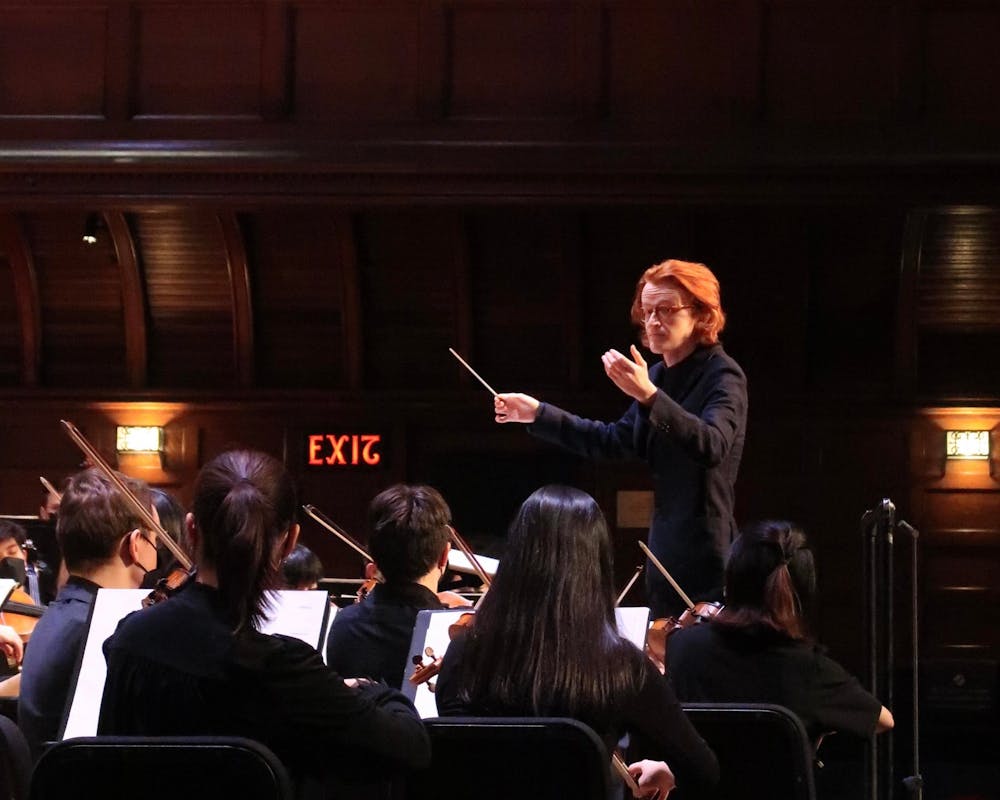In this digital day and age, witnessing the grandeur of the symphony is an often forgotten privilege. A few weeks ago, I was treated to the exquisite repertoire of the Princeton University Orchestra and felt reminded of the sheer physical and emotive force of live classical music.
The Princeton University Orchestra (PUO) is Princeton’s flagship symphony orchestra. On Feb. 25 and 26, over 100 undergraduate musicians graced the stage of Richardson Auditorium to deliver one of PUO’s eight annual performances. This concert was the product of many hours of practice on the part of the performers, as well as much time and care invested on the part of Maestro Michael Pratt. This year marks Pratt’s 44th straight season as PUO’s musical director.
Friends and family of the performers reclined beneath Richardson’s warm lights and elegant decor, which lent the evening an intimate, refined ambience well-suited to the occasion. The program featured solos by soprano Marley Jacobson ’22 and violist Andrew Jung ’25, as well as two pieces curated and conducted by music certificate students Montagu James ’22 and Elijah Shina ’22.
Jacobson captured the audience’s ear and imaginations with Mozart’s “Vorrei spiegarvi, oh Dio!” (K. 418). According to Jacobson’s program notes, Mozart composed the aria for Aloysia Weber Lange, a soprano “known for her expressive technique and powerful high notes.” Jacobson’s high notes were powerful indeed — effortless and equally resonant as her lows. Sung from the guilty perspective of a maiden unable to return her suitor’s affection, the piece showcased Jacobson’s staggering vocal skill and maturity as an actor. Spellbound by her mournful gaze, I marveled at Jacobson’s commanding presence and vocal projection. Her final note was an astonishing A3, the lowest note demanded of soprano singers. Six of the soloist’s friends leapt to their feet, and I shared in their enthusiastic applause.
Next, Maestro James conducted the enchanting “Adagio Pas de Deux” from Khachaturian’s “Spartacus.” With fluid gestures and a composer’s sensitivity, James carefully cued in each section. Gentle arpeggios in the harp and winds gave way to a sweeping “love theme” in the strings. A winding journey through a sea of mixed keys and textures climaxed in a flood of harmony. Wave after luscious wave of sound crashed over the concert hall as the violins soared, restating the love theme against a stirring countermelody in the horns. At James’s command, the orchestra retreated to a whisper, drifting a while before coming to rest on a tender tonic chord.
The concert took a dramatic turn under Maestro Shina’s baton with Brahms’s “Tragic Overture.” Tragic is the somber counterpart to Brahms’s jubilant “Academic Festival Overture.” Oscillating between tranquil and epic, with rousing percussion and anthemic moments of unison, this piece demanded precision from the orchestra and strong leadership from the conductor. Shina conducted with gusto, and his prowess as a concert percussionist showed in his steady pulse and attention to rhythmic detail. Like with the Khachaturian, I was struck by the rich orchestration and dynamic range of this piece. The blaring of the brass and timpani in the exposition contrasted sharply with the subdued winds in the second section. An octave fanfare signaled the return of the theme, and Shina propelled the orchestra through to a fortissimo finish.
Jung closed out the night with a virtuosic rendition of Bartok’s Viola Concerto, Sz. 120. The viola is so often overshadowed in the canon by its smaller, shriller cousin. However, Jung chose a fantastic piece with which to display his skill and prove his instrument’s worth. Jung negotiated difficult passages with seeming ease, cleanly executing harmonics and double stops — advanced techniques I had only ever heard performed on the violin. Jung bowed life into each musical phrase through his delicate treatment of timbre and volume. Embracing time’s ebb and flow, he maintained a gentle rubato as the orchestra paid homage to the colorful modes and rhythms of Hungarian folk music. At the end of three impeccable movements, Jung accepted a well-deserved standing ovation with a bright smile and a humble bow.
Musical skill is so often called “talent,” but “talent” overlooks the passion and the process crucial to developing musical ability. Talent is innate, but skill is practiced; skill is learned. PUO are not merely talented performers, but skilled artists for whom music is a gift to be nurtured and shared. I speak not only of the four featured musicians, but of each integral member of the symphony, whose skill and dedication to their craft was clear to see and hear in the caliber of this spring concert. Bravo!

Sage Kanemaru is a contributing writer for the Prospect. He can be reached at kanemaru@princeton.edu or on Instagram at @sagek.ane.









